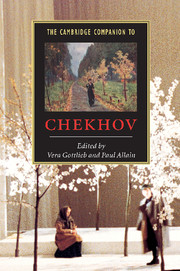Book contents
- Frontmatter
- Part 1 Chekhov in context
- Part 2 Chekhov in production
- Part 3 Chekhov the writer
- 16 Chekhov's stories and the plays
- 17 The stage representation of Chekhov's women
- 18 Chekhov's comedy
- Appendix 1 Chekhov's works: primary sources from the Russian - Variations of English titles from the Russian
- Appendix 2 Selected stage productions
- Appendix 3 Selected screen versions
- Appendix 4 Illustrations
- Selected bibliography
- Index of Works by Checkov
- General Index
16 - Chekhov's stories and the plays
from Part 3 - Chekhov the writer
Published online by Cambridge University Press: 28 May 2006
- Frontmatter
- Part 1 Chekhov in context
- Part 2 Chekhov in production
- Part 3 Chekhov the writer
- 16 Chekhov's stories and the plays
- 17 The stage representation of Chekhov's women
- 18 Chekhov's comedy
- Appendix 1 Chekhov's works: primary sources from the Russian - Variations of English titles from the Russian
- Appendix 2 Selected stage productions
- Appendix 3 Selected screen versions
- Appendix 4 Illustrations
- Selected bibliography
- Index of Works by Checkov
- General Index
Summary
Even to those who loathed Chekhov's plays, his unorthodox drama was marked by the techniques of a short-story writer who refused to limit his imagination to the confines of the stage or meet its demands for intrigue, denouement, climax, let alone recognise its genres of comedy and tragedy. An all-controlling author-narrator refused to get off the stage. In November 1889 the actor-manager Lensky told Chekhov after the rejection of The Wood Demon by the Imperial Theatre Committee not to write plays: 'I'll say one thing: write long stories. Your attitude to the stage and to dramatic form is too contemptuous, you respect them too little to write a drama. This form is more difficult than narrative form, but you, forgive me, have been too spoiled by success to study dramatic form properly ... or to come to love it.'
- Type
- Chapter
- Information
- The Cambridge Companion to Chekhov , pp. 203 - 215Publisher: Cambridge University PressPrint publication year: 2000
- 1
- Cited by

